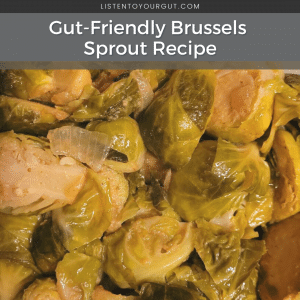
So, I grabbed the bag and began to look into a recipe I could create that is gut-friendly for the LTYG community, as well as some additional info on how Brussels spouts can be beneficial to the gut.
Now keep in mind, although I modified this recipe, Jini ONLY recommends eating Brussels sprouts at Phase Four of the Food Reintroduction Chart found in her book, Listen to Your Gut (page 251). So, until you are at Phase Four I would not try this recipe just yet. Cruciferous veggies can cause bloating and gas if you have not reached stage four – instead, save this recipe for the future. 🙂
Brussels Sprouts for Gut Health
So for those of us healed enough to consume Brussels spouts, let’s talk about how they can help your gut! I came across this lovely recipe that I modified to make it more gut-friendly – see some of the benefits this chef mentions in the recipe:
“In a recent study published about the effects of consuming cruciferous vegetables like Brussels sprouts related to the gut microbiome, the researchers found that the human gut bacteria composition was altered by an increase in Brussels sprouts consumption, which could ultimately influence the gut metabolism of bioactive food components.
In other words, the consumption of Brussels sprouts increases the good bacteria living in your gut which could help promote digestion and eliminate more harmful bacteria.”
This additional study I found shows how cruciferous veggies may help decrease your risk of colorectal cancer:
“A high intake of glucosinolate-containing cruciferous vegetables, such as Brussels sprouts (Brassica oleraceae), has been linked to a decreased cancer risk…
In conclusion, consumption of glucosinolate-containing Brussels sprouts for 1 week results in increased rectal GST-alpha and -pi isozyme levels. We hypothesize that these enhanced detoxification enzyme levels may partly explain the epidemiological association between a high intake of glucosinolates (cruciferous vegetables) and a decreased risk of colorectal cancer.”
Brussel sprouts are also high in antioxidants, vitamins, and minerals. Read 9 Ways Brussels Sprouts Benefit Your Health here.
Now for the recipe…
Gut friendly Brussels Sprout Recipe
Ingredients:
1 lb Brussels sprouts
1 Onion (*omit if do not tolerate)
2 tbsp Organic Mustard
2 tbsp Avocado Oil
1 tbsp organic Maple Syrup (*you can also use Manuka honey, stevia, or monk fruit (Luo han guo)
½ tbsp Garlic Powder (*omit if do not tolerate)
½ tbsp Salt and Pepper
I first cut all the Brussels sprouts in half and threw them into a bowl of water (filtered) and white vinegar. I usually eyeball it, but I often use ½ – 1 cup of white vinegar in a bowl of water (depending on the size of the bowl).
I ALWAYS wash my fruits and veggies first before consumption to eradicate pesticides and any bacteria/pathogens.
As I let them soak, I got the burner heated up and began dumping my sauce ingredients into a large pot. As the pot heated up, I chopped one onion and added it along with all the other ingredients to let them simmer and really let the flavors develop.
The reason I am cooking these Brussel sprouts in a big pot rather than baking them is the steam makes them soft and reduces the fiber and roughage, so this makes them gut-friendly! They reduce a bit and are much softer to eat. They may not have that crunch, but your gut will thank you! 🙂
After about 15-20 minutes of the Brussel sprouts soaking, and as the ingredients in the pot came to a simmer, I added in my Brussels sprouts. I added them in slowly and in batches, making sure they were coated with the flavor. Note you don’t have to use the full 1 pound of Brussel sprouts if you don’t want to, but I was cooking for the family too. You can also adjust the amount of seasoning/add more if needed.
Cook all of this in the pot until you see the Brussel sprouts turn dark green and soft. That’s when you know they are ready to consume!
Note, however, since they are so soft – I recommend eating them right away (or within a day) as they may begin to fall apart or get too soggy after that.
All in all, this had a really nice sweet and salty taste! I hope you enjoy, and please let me know if you try this recipe and what you think. 🙂
Until next time, happy eating, happy healing – and remember to always listen to your gut!




I appreciate your sharing this. I have been craving brussel sprouts since my UC diagnosis but terrified to eat them. But also a question, even though they were organic you soaked them? Was that to soften to help with digestion or because you were washing them? I don’t wash organic produce but would discard the two outer leaves.
Hi Kay! I really appreciate you reaching out. I’m glad this post resonated with someone. 🙂
I also peel the outer layer, but in addition I thoroughly clean all my fruits and vegetables. Reason being, there are so many pesticisides, chemicals and microbials that live on produce that its best to thouroughly wash everything to avoid any food contamination which can severely affect the GI and one’s health (esepcially with IBD as we can have more “sensitive GI tracts”).
I have done different washing methods but a common one is using organic white vinegar (soak them) and then thoroughly rinse.
Jini recommends: “To remove pesticides, spray vegetables and fruits with a 3% solution of hydrogen peroxide and then rinse.”
Soaking produce or making your own spray is helpful and then you rinse with clean filtered water to avoid any water contamination.
-Linsy
Thanks so much for responding! I stopped at the produce stand today and grabbed some along with a sweet onion. Can’t wait to prep, cook and eat these this evening! 🙂
Hi Kay! You are awesome! Thanks for your support, and I’m so excited for you to try those sprouts. I hope you like the recipe!!
If you get any GI discomfort eating the sprout at all, I found that taking 1 Natren’s Healthy Trinity capsule before eating sprouts (or any meal that I might be more sensitive to) really helps break it all down well.
Healthy Trinity capsule:
https://shoppe.listentoyourgut.com/natren-healthy-trinity-probiotic/
You can also try these enzymes in the middle of the meal:
https://shoppe.listentoyourgut.com/houston-enzymes-tri-enza-45-dose-90-capsules/
Just extra tips I thought I’d throw out there to ya!
If you have any tips on the recipe lmk! I can’t wait to hear how you like it. 🙂
Linsy
Linsy,
I got busy over the weekend but wanted to be sure & come back to tell you, I loved this recipe! Seriously delish.
🙂
Kay!
So lovely to hear from you! 🙂 I am just so happy to hear that, and that it satisfied your brussel sprout cravings!
Are there any other foods you might like to see a recipe from us at LTYG? Or any topics that might be helpful for you on your gut health journey?
We are always open to suggestions from our readers!
-Linsy